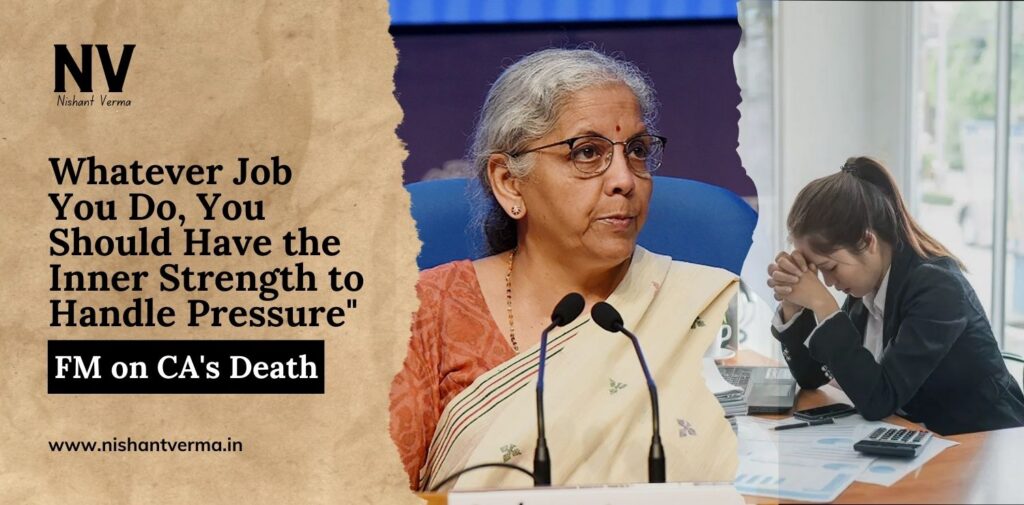The tragic death of a 26-year-old employee of Ernst & Young (EY) due to alleged work pressure has sparked a significant public conversation on the issue of mental health, work-related stress, and how corporates handle employee welfare. FM on CA’s Death made a statement in response to this incident, saying, “Whatever job you do, you should have the inner strength to handle pressure.” Her comment has since garnered mixed reactions, with some interpreting it as a form of victim-blaming while others believe it highlights the need for individual resilience in stressful environments.
In this article, we will explore the incident, the implications of the Finance Minister’s remarks, and how work pressure can affect mental health, especially in high-demand professions such as chartered accountancy (CA). We will also look at the broader corporate culture and its responsibility toward employee well-being.
The Tragic Incident: EY Employee’s Death
The death of the 26-year-old EY employee brought attention to the work culture in big corporations, where high levels of stress and pressure are often considered normal. Reports suggest that the employee was under immense work pressure, and this incident has raised concerns about whether the corporate sector is doing enough to protect the mental health of its employees.

Many young professionals working in top firms like EY face long working hours, tight deadlines, and intense pressure to meet expectations. This can lead to burnout, stress, and, in extreme cases, incidents like this one. The death of this young CA has shaken many and has prompted a reevaluation of how workplace stress and mental health issues are handled in the corporate world.
FM on CA’s Death: Inner Strength to Handle Pressure
After the incident, Finance Minister Nirmala Sitharaman made a statement saying that employees need to have “inner strength” to cope with pressure. While the comment was intended to emphasize the importance of mental resilience, it has been interpreted by some as insensitive, especially in the context of a tragic death. The suggestion that individuals must build their own capacity to handle stress, without a focus on how work environments contribute to that stress, raised questions.
Critics, including politicians like Kerala’s higher education minister R Bindu, have argued that the Finance Minister’s comments were an attempt to shift the responsibility away from corporations, blaming the victim instead. They suggest that the focus should be on creating healthier, more supportive work environments rather than simply telling employees to be more resilient.
Work Pressure and Its Impact on Mental Health
The high-pressure work culture in India’s corporate sector is not a new phenomenon. From long working hours to unrealistic deadlines, employees often face environments that demand high productivity at the cost of their mental and physical well-being.
Work Pressure in High-Demand Professions
Professions like chartered accountancy (CA), investment banking, law, and consulting are notorious for high levels of stress. These jobs often require individuals to work late into the night, manage multiple clients, and deliver results under intense scrutiny. Young professionals entering these fields may feel the pressure to prove themselves, leading to long-term stress and burnout.
In such jobs, the “grind” culture is often glorified. Phrases like “toughen up” and “that’s part of the job” are frequently used to justify the immense workload. However, normalizing stress and long hours can have damaging effects on an employee’s health, leading to anxiety, depression, and even physical health issues.

Mental Health Crisis in the Corporate Sector
The growing emphasis on mental health awareness in India highlights how widespread this issue is. Mental health problems, including anxiety, depression, and burnout, are increasingly prevalent in the workforce. However, discussions around mental health in the corporate sector often remain stigmatized. Employees are sometimes reluctant to admit to mental health struggles for fear of being seen as weak or unfit for the job.
In recent years, numerous studies have shown a correlation between job-related stress and poor mental health. The World Health Organization (WHO) classifies burnout as an “occupational phenomenon” that stems from chronic workplace stress. Symptoms include exhaustion, detachment from the job, and reduced performance.
Many young professionals, like the EY employee in this tragic case, may not have adequate coping mechanisms or support systems to deal with the constant pressure. The demands of corporate life, coupled with the lack of mental health resources, can create a toxic environment for employees.
Corporate Responsibility: Creating Healthy Work Environments
While personal resilience is important, the responsibility for managing stress cannot rest solely on employees. Companies, especially large corporations like EY, have a duty to create supportive environments that prioritize mental health and well-being.
The Need for a Balanced Approach
A balanced approach to handling work pressure requires a combination of personal resilience and corporate responsibility. On one hand, employees should be encouraged to develop coping mechanisms to manage stress, such as time management, seeking help when needed, and maintaining a healthy work-life balance. On the other hand, companies must also take proactive steps to reduce the sources of stress in the workplace.
What Can Corporates Do?
Corporations should focus on creating a culture of openness and support around mental health. Some practical steps include:
Providing Mental Health Resources: Offering counseling services, mental health workshops, and wellness programs can give employees the tools they need to manage stress. These resources should be easily accessible and confidential to ensure that employees feel comfortable seeking help.
Promoting Work-Life Balance: Encouraging employees to take time off, offering flexible working hours, and discouraging the “always-on” culture can help alleviate stress. Corporations should set realistic expectations for work hours and deadlines.

Training Managers to Recognize Stress: Managers play a key role in an employee’s day-to-day work experience. By training managers to recognize the signs of stress and burnout, companies can intervene before stress escalates into a more serious mental health issue.
Reducing the Stigma Around Mental Health: Mental health issues should be treated the same as physical health problems. Creating an open dialogue about mental health in the workplace can help reduce the stigma and encourage employees to seek help without fear of judgment.
Building Resilience: The Role of Inner Strength
While corporations have a responsibility to provide a healthy work environment, individuals also need to build their own resilience to cope with work pressure. Developing “inner strength” to handle stress is a valuable life skill, not just for the workplace but for overall well-being.
Practical Steps to Build Resilience:
- Time Management: One of the most effective ways to reduce stress is by managing time effectively. Learning to prioritize tasks, delegate when necessary, and avoid procrastination can help ease the pressure of tight deadlines.
- Mindfulness and Relaxation: Practices like meditation, yoga, and deep-breathing exercises can help reduce stress and build mental resilience. Taking regular breaks to clear the mind and reset can prevent burnout.
- Seeking Help When Needed: Whether it’s talking to a friend, family member, or counselor, seeking support during difficult times can make a significant difference in how one handles stress. Having a support system in place is crucial for mental health.
- Setting Boundaries: Learning to set boundaries, such as not checking work emails after a certain time or taking weekends off, can create a healthier work-life balance.
Conclusion: A Shared Responsibility
The tragic death of the EY employee has opened up important conversations about work pressure and mental health in the corporate sector. While personal resilience is essential, the responsibility for managing stress cannot rest solely on the individual. Corporations must play a larger role in creating supportive work environments that prioritize employee well-being.
The Finance Minister’s remarks on “inner strength” should be seen in context. Yes, individuals need to build coping mechanisms to deal with stress, but the larger issue of corporate responsibility must not be overlooked. It is time for companies to recognize the importance of mental health and take steps to ensure that their employees are not just productive but also healthy and happy.
Ultimately, a healthy workplace is one where both personal resilience and corporate responsibility come together to create a supportive, balanced environment for all employees.




